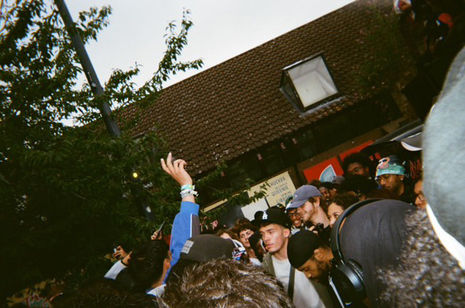Genre’s dead. Long live Jim Legxacy
Seun Ige on the ‘sonic boldness’ of Jim Legxacy’s Black British Music

The first time I listened to Black British Music, I did not walk away with a favourite standout track, and that surprised me. Usually, something sticks, even if my top pick changes with time. But this mixtape did not work like that. It did not feel produced for instant highlights, but instead, painted an complex and intentional landscape.
“Its emotional honesty and sonic boldness resonate far beyond South East London; it is specific, but not exclusive”
I took a walk to my local park in South East London, sat on my favourite bench, and let it run. Something about the album felt lived in, as if it had already walked these same streets I was pacing. Rooted in South London textures, Black British Music carries the cadence of what it is like to live in South East London, occupying spaces from public transport and chicken shops on the high street, to your mum’s living room. Yet, despite its local DNA, it does not stay bound to postcodes. Its emotional honesty and sonic boldness resonate far beyond South East London; it is specific, but not exclusive.
Jim’s identity is everywhere, embedded in the genre switches and moments that felt like voice notes from friends. It is a collection of sounds that form like a fragmented collage. The record starts with ‘context’, which explains with a devastating clarity the trauma that served as a catalyst for the project. The track ‘father’ rides on a sped up chipmunk soul sample of George Smallwood’s ‘I Love My Father’, using fleeting imagery of his past, with mentions of an absent dad and listening to Mitski on the block, portraying the grittiness of South London visuals. Where ‘father’ explores pain in short bursts, ‘06 wayne rooney’ channels it through the collision of punk guitars and auto-tuned vocals. Then there is ‘sos’, which gives the mixtape its pop-y Afrofusion-tinged moment.
Jim understands that grief does not cancel out celebration. They can, and often do, exist side by side. That emotional duality is one of the mixtape’s best qualities.
What also makes this project exciting is not just that it bends genres, but how intuitively it appears to do so. Jim does not seem to genre hop just to prove range, or to be experimental for the sake of it. The shifts feel like memory, which is often nonlinear, unpredictable and emotionally driven. Take ‘new david bowie’, where glitchy vocals melt into twinkling synths and unfiltered yelling in the background. It sounds sort of chaotic, but if you have ever been twenty-something and overwhelmed, it also sounds right. He does not smooth the transitions but lets them jar, mirroring how emotions can move in real time.
“Emotional duality is one of the mixtape’s best qualities”
Black British Music captures a wide emotional spectrum without needing to explain every shift. Pain is presented honestly and vulnerability is not hidden, but there is lightness and humour too.
Despite working with more collaborators than on his earlier projects, Jim has not lost that sense of small scale intimacy. Even with bigger features and crisper production, the mixtape still feels personal, bearing the fingerprints of bedroom experimentation.
I have also noticed how widely this mixtape is being appreciated. I have seen people from completely different backgrounds play it. I think this speaks to something powerful. Black British Music is incredibly specific, incredibly Black and British, but it welcomes instead of excludes. It demonstrates that music grounded in personal truth can still connect broadly.
At a university like Cambridge where people are always shifting between places, accents, and emotional registers, this mixtape hits a particular nerve. It does not demand a singular identity. It lets contradictions exist, grief and celebration, and gospel chords over rap flows.
As someone who has never been able to define their music taste, Black British Music is important. It does not sit neatly in a genre box, drawing from everywhere but still sounds like home – a messy and shifting kind of home.
 News / Deborah Prentice overtaken as highest-paid Russell Group VC2 February 2026
News / Deborah Prentice overtaken as highest-paid Russell Group VC2 February 2026 News / Christ’s announces toned-down ‘soirée’ in place of May Ball3 February 2026
News / Christ’s announces toned-down ‘soirée’ in place of May Ball3 February 2026 Fashion / A guide to Cambridge’s second-hand scene2 February 2026
Fashion / A guide to Cambridge’s second-hand scene2 February 2026 News / Downing Bar dodges college takeover31 January 2026
News / Downing Bar dodges college takeover31 January 2026 Comment / Men at Cambridge are experiencing equality2 February 2026
Comment / Men at Cambridge are experiencing equality2 February 2026










